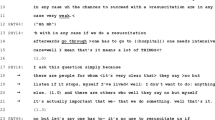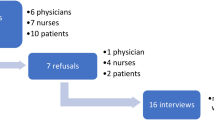Abstract
Amongst traditionally-available frameworks within which end-of-life decisions in Intensive Care Units (ICU) are situated, we favour Ordinary versus Extra-ordinary care distinctions as the most helpful. Predicated on this framework, we revisit the concepts of personhood and autonomy. We argue that a full account of personhood locates its foundation in relationships with others, rather than merely in “rationality”. A full account of autonomy also recognises relationships with others, as well as the actual reality of the patient’s situation-in-the-world. The fact that, when critically ill, the patient may no longer be able to take an active role in decision-making does not bring about the end of their personhood, or of their autonomy. Because the patient’s autonomy is intimately linked to their relationships with others, once critical illness supervenes, respect for their autonomy devolves to those others with whom the patient is in relationship. In practical application, this means that there must be a dialogue, as the end-of-life of the critically-ill patient in ICU comes into view. Such dialogue should be grounded on this understanding in order to conform best to moral philosophical principles. Ideally the dialogue will involve all those with whom the patient is in relationship and, practical difficulties within an ICU notwithstanding, will aim to be inclusive, non-coercive and reflective as it seeks to maximise the good of the patient in their unique context.
Similar content being viewed by others
References
Aggarwal, A., J. Davies, and R. Sullivan. 2014. “Nudge” in the clinical consultation—an acceptable form of medical paternalism? BMC Medical Ethics 15(31): 1–6.
Beauchamp, T. 2009. Moral foundations. In Ethics and epidemiology, eds. S. Coughlin, T. Beauchamp, and D. Weed, 39–41. Oxford: Oxford University Press.
Beauvoir, S. 2011. Biological data. In The second sex. New York: Random House.
Bishop, J.P. 2011. Embracing death. In The anticipatory corpse: Medicine, power, and the care of the dying. Notre Dame: Indiana, University of Notre Dame.
Campbell, Alastair V. 2012. The body: Property, commodity, or gift. In Reconceiving medical ethics: Bloomsbury studies in philosophy, ed. Cowley, Christopher, 1st ed., Chap. 1, 15–29. London: Bloomsbury Academic.
Catholic Health Australia. 2001. Code of ethical standards for catholic health and aged care services in Australia, 1st ed., 44. Red Hill, ACT: Catholic Health Australia Inc. http://www.cha.org.au/images/resources/Code%20of%20ethics-full%20copy.pdf.
Caws, P. 1991. Committees and consensus. The Journal of Medicine and Philosophy. 16: 375–391.
Childress, J. 2001. Christian ethics, medicine, and genetics. In The Cambridge companion to Christian ethics, ed. R. Gill. Cambridge: Cambridge University Press.
DeGrazia, D. 2006. On the question of personhood beyond homo sapiens. In In defence of animals: The second wave, ed. P. Singer, 42. Malden, MA: Blackwell Publishing.
Deligiorgi, Katerina. 2012. The many faces of kantian autonomy. In The scope of autonomy: Kant and the morality of freedom, Chap. 1.2, 18. Oxford: Oxford university Press.
Descartes, Rene. 2011. Of the principles of human knowledge. In The principles of philosophy (trans: Veitch, John). Chap. 10. Whitefish, Montana: Kessinger Publishing LLC.
Engelhardt, H.T. 1996. The context of health care: Persons, possessions and states. In The foundations of bioethics. New York: Oxford University Press.
Fletcher, J.F. 1998. Four indicators of humanhood—the enquiry matures. In On moral medicine: Theological perspectives in medical ethics, ed. S.E. Lammers, and A. Verhey. Grand Rapids: William B Eerdmans Publishing.
Flyvbjerg, B. 2000. Ideal theory, real rationality: Habermas versus Foucault and Nietzsche. Political studies association’s 50th annual conference. London School of Economics and Political Science.
Gert, B. 2004. Features of the moral system. In Common morality: Deciding what to do. Oxford: Oxford University Press.
Gillett, G., and Clair Amos. 2014. Words are not just things. The New Zealand bioethics conference. Jan 26 2014, in Dunedin, Otago, NZ.
Griffioen S. Woudenberg, R. 1990. We must not forget those who are absent: Interview with Karl-Otto Apel on the universality of ethics. In What right does ethics have?: Public philosophy in a pluralistic culture. Amsterdam: VU University Press.
Hellsten, S.K. 2000. Towards an alternative approach to personhood in the end of life questions. Theoretical Medical Bioethics 21(6): 515–536.
Herring, J., and P.-L. Chau. 2007. My body, your body, our bodies. Medical Law Review 15(1): 45.
Ho, A. 2008. Relational autonomy or undue pressure? Family’s role in medical decision-making. Scandanavian Journal of Caring Sciences 22: 128–135.
John Paul II, Pope. 1995. In Evangelium Vitae, Vatican City: Libreria Editrice Vaticana. http://www.vatican.va/holy_father/john_paul_ii/encyclicals/documents/hf_jpii_enc_25031995_evangelium-vitae_en.html.
Janssens, L. 1979. Ontic evil and moral evil. In Readings in moral theology: moral norms in the Catholic tradition, vol. 1, ed. C. Curran, and R.A. McCormick, 40–93. New York: Paulist Press.
Jennings, B. 1991. Possibilities of consensus: towards democratic moral discourse. The Journal of Medicine and Philosophy. 16: 447–463.
Kitwood, T. 2001. On being a person. In Dementia Reconsidered, 8. Buckingham, UK: Open University Press.
Kerridge, I, Lowe, M, and Stewart, C. 2013. Problem solving in clinical ethics and law. In Ethics and law for the health professions. Sydney: The Federation Press.
Kon, A. 2010. The shared decision-making continuum. Journal of the American Medical Association 304(8): 903–904.
Larmore, C. 2008. The problem with morality. In The autonomy of morality, 88. Cambridge: Cambridge University Press.
Mackenzie, C. 2000. Introduction: Autonomy refigured. In Relational autonomy: Feminist perspectives on autonomy, agency, and the social self, ed. N. Stoljar, C. Mackenzie, and N. Stoljar, 3–31. New York: Oxford University Press.
Mathews, Eric. 2012. Old age and dependency. In Reconceiving medical ethics: Bloomsbury studies in philosophy, ed. Cowley, Christopher, 1st ed., Chap. 4, 59–71. London: Bloomsbury Academic.
McCarthy, T. 1981. Moral consciousness and communicative action. Cambridge: Polity Press.
McMahan, J. 2003. Endings. In The ethics of killing. Oxford: Oxford University Press.
Mill, J.S. 1859, 2002. Introductory. In On liberty. New York: Dover Publications.
O’Donovan, O. 1998. Again: Who is a person. In On moral medicine: Theological perspectives in medical ethics, ed. Stephen E. Lammers and A. Verhey. Grand Rapids, Michigan: William B Eerdmans Publishing.
Pellegrino, E. 1985. Moral choice, the good of the patient, and the patient’s good. In Ethics and critical care medicine, ed. John C. Moskop and L. Kopelman. Dordrecht: D Reidel Publishing.
Radha Krishna, L.K. 2013. Accounting for personhood in palliative sedation: the Ring Theory of personhood. Medical humanities. Sep 26. doi: 10.1136/medhum-2013-010368.
Scambler, G. 2001. Introduction: Unfolding themes of an incomplete project. In Habermas, critical theory, and health. London: Routledge.
Scanlon, T.M. 1998. Wrongness and reasons. In What we owe to each other. Cambridge, Mass: Belknap Press of Harvard University Press.
Stoljar, N. 2011. Informed consent and relational conceptions of autonomy. Journal of Medicine and Philosophy 36: 375–384.
Svenaeus, F. 2014. Phenomenology as a method within the realm of bioethics. The New Zealand bioethics conference, Jan 24 2014, Dunedin, Otago, NZ.
Walter, J. 2004. Life, quality of. In Encyclopedia of bioethics, ed. Stephen G. Post. New York: MacMillan.
Walter, J., and L.F. Ross. 2014. Relational autonomy: Moving beyond the limits of isolated individualism. Pediatrics 133: S16.
Warren, M.A. 1973. On the moral and legal status of abortion. In Ethical issues in modern medicine, ed. B. Steinbock, and J.D. Arras. Mayfield Publishing Co: Mountain View.
Wildes, K.W. 1996. Ordinary and extraordinary means and the quality of life. Theological Studies 57: 500–512.
Acknowledgments
We acknowledge the insights of the anonymous reviewers in clarifying our thoughts.
Author information
Authors and Affiliations
Corresponding author
Rights and permissions
About this article
Cite this article
Walker, P., Lovat, T. Concepts of personhood and autonomy as they apply to end-of-life decisions in intensive care. Med Health Care and Philos 18, 309–315 (2015). https://doi.org/10.1007/s11019-014-9604-7
Published:
Issue Date:
DOI: https://doi.org/10.1007/s11019-014-9604-7




